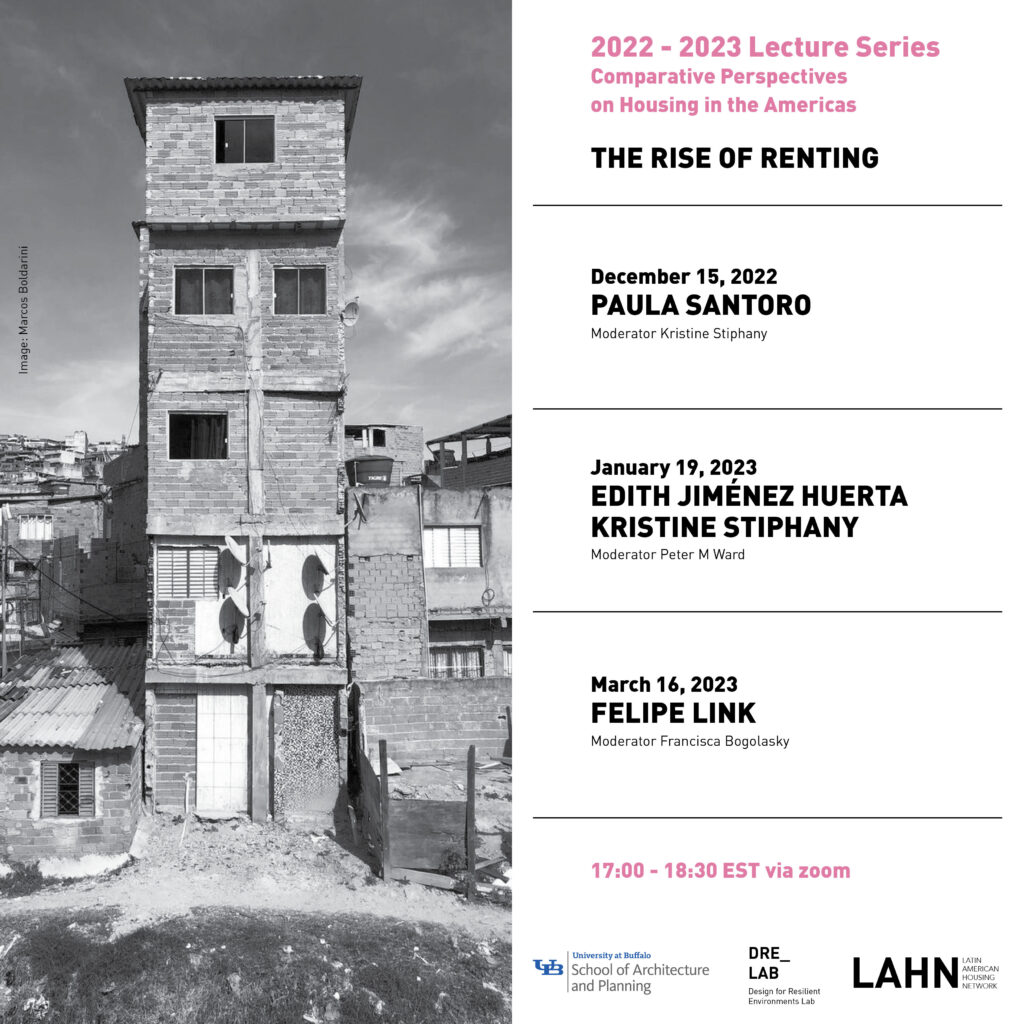Join us on March 16, 2023 from 17:00-18:30 EST for our lecture with Dr. Felipe Link: Mercados del arriendo en Santiago de Chile. Desafíos para la política habitacional/Rental Markets in Santiago de Chile: Challenges for Housing Policy.
Start times: Santiago, São Paulo & Buenos Aires (6:00-7:30pm); Bogota and Austin (4:00-5:30pm) and Mexico City (3:00-5:30pm)
La crisis de la vivienda en Chile se ha acentuado en los últimos años. El efecto de la migración,
la pandemia por Covid-19 y la consecuente crisis económica y social desde 2020, contribuyó a
su radicalización, principalmente en el aumento del número de campamentos y vivienda
informal.
Si bien la política habitacional en nuestro país ha tenido un giro importante hacia mejor
calidad, aumentando el estándar de las viviendas y asumiendo el desafío de mejores
localizaciones, no ha logrado equilibrar este mejoramiento con una producción masiva de
vivienda que contribuya a disminuir efectivamente el déficit de vivienda. Además, persiste una
lógica subsidiaria que genera la paradoja de obtener un voucher, sin poder materializarlo en el
mercado. Por otro lado, el mercado privado de vivienda no subsidiada es cada vez menos
asequible para la gran mayoría de las familias.
En este contexto, el aumento general de la tenencia en arriendo, es parte de la complejidad del
problema actual de vivienda. En los últimos años, la tenencia en arriendo ha aumentado del
16% al 22% de los hogares a nivel nacional y del 19% al 28% en la región Metropolitana de
Santiago.
Entonces, si bien el arriendo, tanto privado como subsidiado, aparecen como una alternativa
con ciertas ventajas para grupos con diferentes características sociodemográficas, para
comprender efectivamente el fenómeno del arriendo a gran escala en Chile, es necesario
conocer y comprender los diferentes mercados del arriendo, así como las prácticas de los
arrendatarios.
La presentación tiene como objetivo caracterizar socio espacialmente los diferentes mercados
de la vivienda en arriendo, específicamente en el área metropolitana de Santiago de Chile. A
partir de esta caracterización, se plantean algunos desafíos para una política habitacional
orientada al acceso a la vivienda a través del arriendo.
The housing crisis in Chile has worsened in recent years. The effects of migration, the Covid-19 pandemic, and the economic and social crisis since 2020, have contributed to this crisis, reflected on the increase of the number of informal settlements and informal housing.
Although housing policy in Chile has had an important shift towards better quality, with improved standards and aiming for better locations, it has not been able to balance this improvement with a massive production of housing that contributes to effectively reducing the housing deficit. In addition, the subsidiary logic persists, which generates the paradox of obtaining a voucher, without being able to use it in the housing market. On the other hand, the private market for non-subsidized housing is becoming less affordable for the vast majority of families. In this context, the increase in the proportion of renters is part of the complexity of this current housing problem. In recent years, renting has increased from 16% to 22% of households nationwide and from 19% to 28% in the Santiago Metropolitan Region. Renting, both private and subsidized, emerges as an alternative with certain advantages for groups with different sociodemographic characteristics. However, in order to effectively understand the phenomenon of large-scale renting in Chile, it is crucial to better understand the different rental markets, as well as tenant practices.
The purpose of the presentation is to socio-spatially characterize the different rental housing markets in the metropolitan area of Santiago de Chile. Based on this, the presentation will also describe some of the challenges that arise for a housing policy with a focus on renting.
If you missed the first two lectures, you can revisit them on our past lectures site.

Visit our past lectures here

